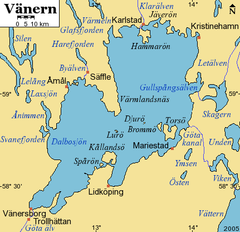Vänern
| Vänern | |
|---|---|

From Hjortens Udde
|
|

Detail map of the lake with surroundings
|
|
| Coordinates | 58°55′N 13°30′E / 58.917°N 13.500°ECoordinates: 58°55′N 13°30′E / 58.917°N 13.500°E |
| Primary inflows | Klarälven |
| Primary outflows | Göta älv |
| Basin countries | Sweden |
| Surface area | 5,650 km2 (2,180 sq mi) |
| Average depth | 27 m (89 ft) |
| Max. depth | 106 m (348 ft) |
| Water volume | 153 km3 (124,000,000 acre·ft) |
| Surface elevation | 44 m (144 ft) |
| Islands | Brommö, Djurö, Fågelö, Hammarö, Kållandsö, Lurö |
| References | |
Vänern (Swedish pronunciation: [ˈvɛːnəɳ]) is the largest lake in Sweden, the largest lake in the European Union and the third-largest lake entirely in Europe after Ladoga and Onega in Russia. It is located in the provinces of Västergötland, Dalsland, and Värmland in the southwest of the country.
Geologically, the lake was formed after the Quaternary glaciation about 10,000 years ago; when the ice melted, the entire width of Sweden was covered in water, creating a strait between Kattegat and the Gulf of Bothnia. Due to the ensuing post-glacial rebound, lakes such as Vänern and Vättern became pursed off. As a result, there are still species remaining from the ice age not normally encountered in freshwater lakes, such as the amphipod Monoporeia affinis. A Viking ship was found on the lake's bottom on May 6, 2009.
A story told by the 13th-century Icelandic mythographer Snorri Sturluson in his Prose Edda about the origin of Mälaren was probably originally about Vänern: the Swedish king Gylfi promised a woman, Gefjon, as much land as four oxen could plough in a day and a night, but she used oxen from the land of the giants, and moreover uprooted the land and dragged it into the sea, where it became the island of Zealand. The Prose Edda says that 'the inlets in the lake correspond to the headlands in Zealand'; since this is much more true of Vänern, the myth was probably originally about Vänern, not Mälaren.
...
Wikipedia
